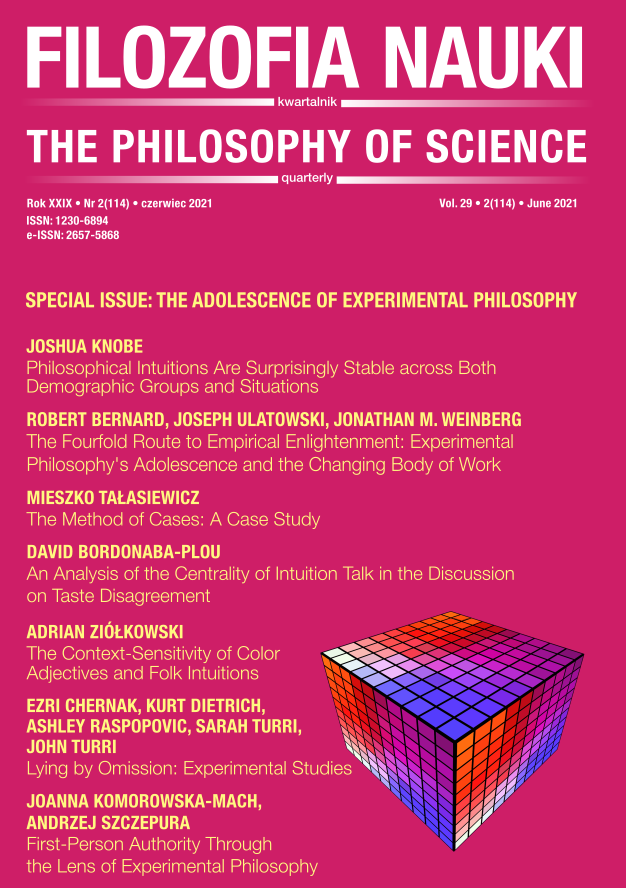Lying by Omission: Experimental Studies
DOI:
https://doi.org/10.14394/filnau.2021.0014Słowa kluczowe:
lying, assertion, communication, omission, signalingAbstrakt
Leading theories of lying disagree on many points, but they agree on the following assumption: lying essentially involves asserting. The possibility of lying by omission poses a challenge to that shared assumption. To lie by omission is to lie by not asserting. This paper is the first experimental investigation of whether lying by omission is conceptually possible, according to our ordinary, shared lying concept. Overall, our results support, without proving, that it is not possible. Based on the present findings, we hypothesize that to the extent that people are tempted to call an omission a “lie,” it is for lack of a better word. When provided more flexibility to express themselves, almost no one in our studies counted an omission as a lie.
Bibliografia
Baayen R. H., Davidson D. J., Bates D. M. (2008), “Mixed-Effects Modeling with Crossed Random Effects for Subjects and Items,” Journal of Memory and Language 59(4), 390-412. https://doi.org/10.1016/j.jml.2007.12.005
Benton M. A. (2018), “Lying, Belief, and Knowledge” [in:] The Oxford Handbook of Lying, J. Meibauer (ed.), Oxford: Oxford University Press. https://doi.org/10.1093/oxfordhb/9780198736578.013.9
Clark H. H. (1973), “The Language-as-Fixed-Effect Fallacy: A Critique of Language Statistics in Psychological Research,” Journal of Verbal Learning and Verbal Behavior 12, 335-359. https://doi.org/10.1016/S0022-5371(73)80014-3
Clarke R. (2014), Omissions: Agency, Metaphysics and Responsibility, Oxford: Oxford University Press. https://doi.org/10.1093/acprof:oso/9780199347520.001.0001
Judd C. M., Westfall J., Kenny D. A. (2012), “Treating Stimuli as a Random Factor in Social Psychology: A New and Comprehensive Solution to a Pervasive but Largely Ignored Problem,” Journal of Personality and Social Psychology 103(1), 54-69. https://doi.org/10.1037/a0028347
Litman L., Robinson J., Abberbock T. (2017), “TurkPrime.com: A Versatile Crowdsourcing Data Acquisition Platform for the Behavioral Sciences,” Behavioral Research Methods 49(2), 1-10. https://doi.org/10.3758/s13428-016-0727-z
Mahon J. E. (2016), “The Definition of Lying and Deception” [in:] The Stanford Encyclopedia of Philosophy (Winter 2016 Edition), Edward N. Zalta (ed.), https://plato. stanford.edu/archives/win2016/entries/lying-definition/.
R Core Team (2018), R: A Language and Environment for Statistical Computing, Vienna: R Foundation for Statistical Computing.
Sartorio C. (2009), “Omissions and Causalism,” Noûs 43(3), 513-530. https://doi.org/10.1111/j.1468-0068.2009.00716.x
Strichartz A. F., Burton R. V. (1990), “Lies and Truth: A Study of the Development of the Concept,” Child Development 61(1), 211-220. https://doi.org/10.2307/1131060
Turri A., Turri J. (2015), “The Truth about Lying,” Cognition 138(C), 161-168. https://doi.org/10.1016/j.cognition.2015.01.007
Turri A., Turri J. (2016), “Lying, Uptake, Assertion, and Intent,” International Review of Pragmatics 8(2), 314-333. https://doi.org/10.1163/18773109-00802006
Turri A., Turri J. (2021), “Lying, Fast and Slow,” Synthese 198, 757-775. https://doi.org/10.1007/s11229-018-02062-z
Turri J. (2016), Knowledge and the Norm of Assertion: An Essay in Philosophical Science, Cambridge: Open Book Publishers. https://doi.org/10.11647/OBP.0083
Turri J. (2017), “Experimental Work on the Norms of Assertion,” Philosophy Compass 12(7), e12425. https://doi.org/10.1111/phc3.12425
Turri J., Park Y. (2018), “Knowledge and Assertion in Korean,” Cognitive Science 42(6), 2060-2080. https://doi.org/10.1111/cogs.12621
Vrij A. (2008), Detecting Lies and Deceit: Pitfalls and Opportunities, 2nd ed., Hoboken, NJ: John Wiley & Sons.



















 Filozofia Nauki | ISSN 1230-6894 | e-ISSN 2657-5868
Filozofia Nauki | ISSN 1230-6894 | e-ISSN 2657-5868